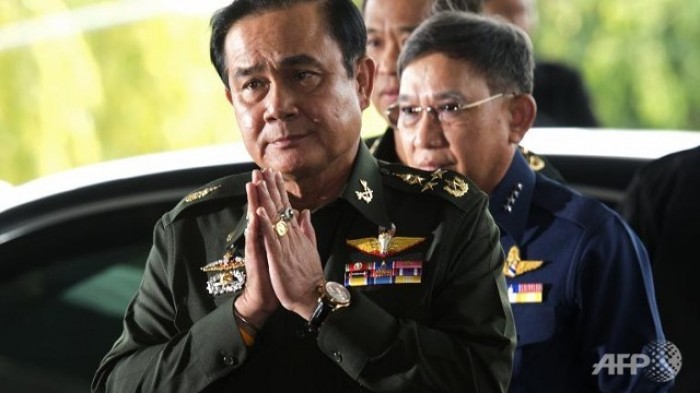Published in the Nikkei Asian Review May 26th 2014
The land of smiles is once more under the rule of the men in khaki. Thailand’s latest coup d’etat is an attempt to cut the Gordian knot of escalating confrontation between the yellow-shirted supporters of the Bangkok establishment and the red-shirted supporters of ousted Prime Minister Yingluck Shinawatra and her brother, Thaksin Shinawatra, who appears to have been remote-controlling her administration from his place of exile.
This is Thailand’s umpteenth coup in the modern period so the generals know the routine well by now. No blood has been shed so far– though it remains to be seen how the red shirts respond – and there have been no perturbations in the financial markets. Foreign companies with operations in Thailand seem less concerned about the democratic process than the predictability of policy and the risks of street violence in the business districts. Some have welcomed the coup for its stabilizing effect.
Indeed over the years Thailand’s history of coups has been no impediment to its track-record of solid growth and increasing importance as a center for foreign direct investment. There is little reason to think this time will be different.
Western governments have dutifully condemned the removal of an elected leader, but the reality is that democratic politics had failed Thailand. The red-yellow conflict was intensifying and other organs of state were being sucked into the struggle. With the revered King in uncertain health, that was a recipe for dangerous instability.
Winston Churchill famously remarked that democracy is the worst form of government except for all the others. In Thailand’s current circumstances, that may not be true. Democracy punctuated by spells of military rule may be the optimum solution. Just as the threat of a hostile takeover keeps corporate managements on their toes, so the threat of military takeover may be necessary to restrain the excesses of politicians.
Ultimately resolving Thailand’s deep political divisions depends on the narrowing of regional and social disparities. That in turn depends on sustained economic growth, which itself depends on political stability. Maintaining a virtuous circle of this sort is no easy matter. The process will be long drawn out and tortuous at best.
The contrast with India, the darling of investors once more after the dramatic electoral victory of Narendra Modi, is striking. Despite its lower ranking in terms of per capita gross domestic product, India is comfortable with its turbulent democracy and is benefitting from the system’s key advantage – the ability to effect peaceful transitions and thus to experiment with new approaches and make progress over time.
India, though, is atypical, perhaps because it is too vast and complex to be riven by anything as uni-dimensional as the red-yellow divide. Thailand’s quandary is one that many other countries have faced. Rapid economic development is often unevenly spread amongst different regions and groups. If a numerical minority generates the bulk of value added, under a pure democracy the majority can use the ballot box to extract rents from them, allowing those who control the process to amass extraordinary wealth and political power. In emerging countries this can do serious damage to the fragile foundations of prosperity.
Japan experienced a milder version of Thaksin-omics in the 1970s, when self-made man Kakuei Tanaka rose to the commanding heights of politics by syphoning off wealth from the rapidly growing cities and redistributing it to rural areas – which were greatly over-represented in the lop-sided electoral system. He was stopped not by the military, but by a judicial coup – an investigation into his financial affairs orchestrated by the Japanese establishment. Even after Tanaka was found guilty of corruption, he continued to win landslide victories in his Niigata constituency, which had the highest public works spending per capita in the country.
The economic thinker Friedrich Hayek recognized the flaws of pure, undiluted democracy. “A limited democracy might indeed be the best protector of individual liberty,” he wrote. “But an unlimited democracy is probably worse than any other form of unlimited government, because its government loses the power to do what it thinks right if any group on which its majority depends thinks otherwise.”
Several of Asia’s wealthiest countries – such as South Korea and Taiwan – became successful democracies only after decades of rapid economic growth built a large middle-class with a stake in future stability and prosperity. Likewise many western countries expanded the franchise in stages during the 19th and early 20th centuries, restricting it initially to property owners and tradesmen. It was in 1918 that Britain granted full male suffrage, just seven years before Japan. Swiss women got the vote only in 1970.
In today’s world, the idea of gradual organic development of political and economic systems is out of fashion. The choice is binary – you either have democracy or you do not. Yet far from being a panacea, as Western idealists have supposed, democratic fundamentalism has brought some societies to the brink of disintegration.
The result of trying to foist full democracy on Egypt, Libya and other countries of the Arab spring has been chaos and the current mess in the Ukraine is partly the result of the West’s maximalist approach to political reform.
As they survey other political upheavals in the world, some Thais might not disagree with the generals’ prophylactic intervention.
